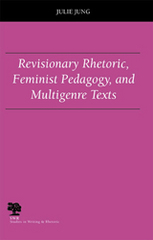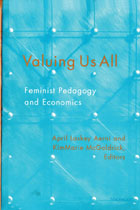
In this precise and provocative treatise, Julie Jung augments the understanding and teaching of revision by arguing that the process should entail changing attitudes rather than simply changing texts. Revisionary Rhetoric, Feminist Pedagogy, and Multigenre Texts proposes and demonstrates alternative ways of reading, writing, and teaching that hear silences in such a way as to generate personal, pedagogical, and professional revisions. As both a challenge to prevailing revision pedagogies and an elaboration of contemporary feminist rhetorics, the volume encourages students and instructors to examine their identities as scholars of rhetoric and composition and to question how and why revision is taught.
Jung analyzes feminist texts to identify a revisionary rhetoric that is, at its core, most concerned with creating a space in which to engage productively with issues of difference. This synthesis of feminist theory and revision studies yields a pedagogically useful definition of feminist rhetoric, through which Jung examines the insights afforded by multigenre texts in various related contexts: the academic essay, the discipline of rhetoric and composition studies, feminist composition, and the subfields of English studies including rhetoric and composition, literature, and creative writing. Jung illustrates how multigenre texts demand innovative methods of inquiry because they do not fit the conventions of any single genre. Because genre is inextricably tied to the construction of social identity, she explains, multigenre texts also offer a means for understanding and revising disciplinary identity.
Boldly making a case for the revisionary power of multigenre texts, Jung retheorizes revision as a process of disrupting textual clarity so that differences can be identified, contended with, and perhaps understood. Revisionary Rhetoric, Feminist Pedagogy, and Multigenre Texts makes great strides towards defining feminist rhetoric and ascertaining how revision can be theorized, not just practiced. Jung also provides a multigenre epilogue that explores the usefulness of reconceiving revision as a progression towards wholeness rather than perfection.

This volume collects pioneering work on the integration of feminist pedagogy in economics. Part 1 introduces a vision of feminist pedagogy, explains the importance of developing feminist pedagogy in economics, and proposes a model for achieving feminist pedagogy in economics that suggests changes in both course content and teaching methods. Part 2 reveals how current course content is narrowly defined and demonstrates how content can be altered to be more inclusive. Included are an analysis of current textbook treatments and examples of broadening discussions of labor supply models, U.S. poverty, and stereotyping, as well as general overviews of macro- and microeconomic courses. Part 3 reports on current disparities in economics education by gender and provides alternative teaching strategies for correcting this problem, including the service learning, peer review, e-mail discussion lists, case studies, internships, and collaborative learning.
The contributors incorporate their vision of a new pedagogy with important economic concepts emphasizing equity as well as efficiency, cooperation as well as competition, and inter-dependence as well as independence. The volume will be a valuable resource for college faculty teaching economics in the United States, as well as to those teaching in related disciplines who want to design exercises that promote a more inclusive classroom environment through changes in both content and teaching methods.
April Laskey Aerni is Associate Professor of Economics, Nazareth College of Rochester. KimMarie McGoldrick is Associate Professor of Economics, University of Richmond.
READERS
Browse our collection.
PUBLISHERS
See BiblioVault's publisher services.
STUDENT SERVICES
Files for college accessibility offices.
UChicago Accessibility Resources
home | accessibility | search | about | contact us
BiblioVault ® 2001 - 2024
The University of Chicago Press









